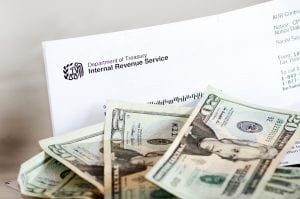Can Bankruptcy Wipe Out My Back Taxes?

Are you facing growing tax burdens or other debt that you can’t pay off? Contact Sirody & Associates for a free consultation.
How Bankruptcy Affects Filing Your Taxes
f you file for bankruptcy, you still need to file your taxes. Under the current tax laws, debts that are discharged during a bankruptcy are excluded from income despite the fact that the cancellation of debt is normally considered part of your taxable income. It’s important to note, however, that any personal expenditures you acquire during personal bankruptcy are not tax-deductible.
Can Bankruptcy Wipe Away Federal Tax Debt?
If you file for Chapter 7 or Chapter 13 bankruptcy, you will likely have to pay any back taxes in full or as part of a repayment plan. However, you can wipe out federal tax debts if the following conditions are true:
- The tax debt is a minimum of three years old. In order to meet this condition, the original tax return has to have been filed at a minimum three years prior to the time that you file for bankruptcy.
- You filed a tax return at least two years prior to filing for bankruptcy. To meet this criteria, you needed to have filed a tax return for the tax debt that you wish to eliminate at a minimum two years before you are filing for bankruptcy. In many cases, if you filed your income tax return late, you are considered not having filed and you can therefore not wipe away the tax debt.
- The tax debt is for income taxes. If the tax debts are for anything other than income taxes (for example, penalty payments or payroll taxes) cannot be discharged as part of a bankruptcy.
- You did not commit willful evasion or fraud. If you in any way willfully tried to evade paying taxes, your tax debts cannot be relieved. Fraud includes actions such as falsifying a social security number on a tax return or filing a fraudulent federal tax return.
- The tax debt has not been assessed yet or in the previous 240 days. To meet the “240 day rule” criteria, your federal income tax debt must have been assessed by the IRS at a minimum of 240 days before you filed for bankruptcy, or not assessed at all. This 240 day guideline may in some cases be extended if the IRS suspended collecting the debt due to a previous bankruptcy filing or an offer in compromise.
Other Important Considerations
It’s important to note that if you have a federal tax lien on your property, this will remain in place after you file for bankruptcy. Also, tax debts for unfiled taxes, tax penalties from tax debts and withholding and trust fund taxes that are withheld from an employee’s paycheck by the employer and cannot be eliminated as part of a bankruptcy. Tax codes and bankruptcy law are both confusing to the average consumer. Protect yourself by partnering with an experienced bankruptcy attorney.
Questions about bankruptcy and taxes? Contact Sirody & Associates for a free consultation.
